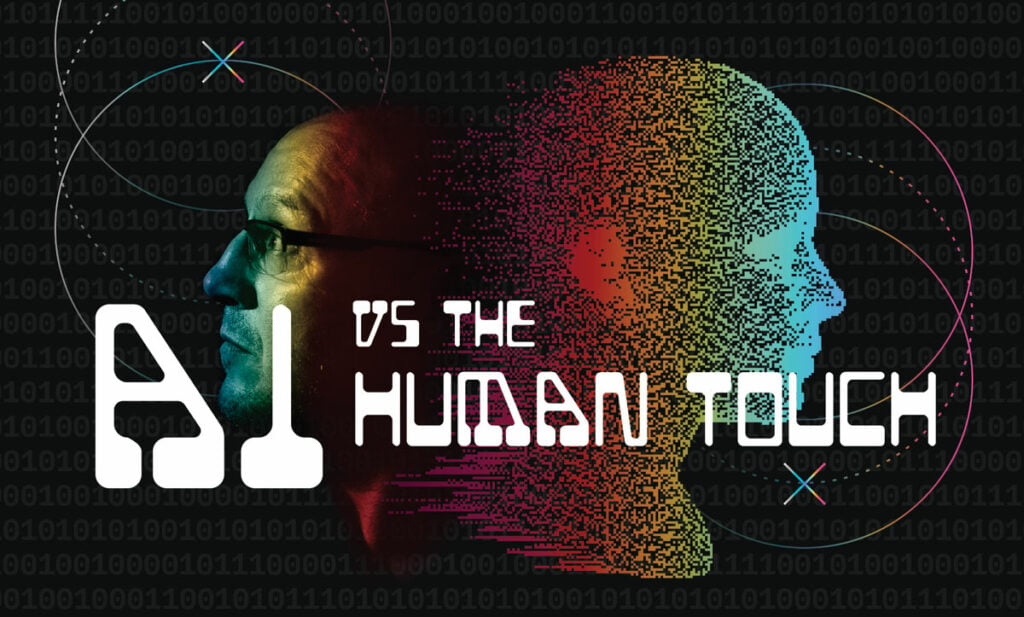By: Jennifer Burr
The world is, once again, experiencing an industrial revolution. This time, it’s artificial intelligence (AI) driving the gears of progress. In this time of rapid technological advancement, businesses are racing to embrace AI technology to increase efficiency, motivate consumers and ultimately surpass the competition. Modern-minded organizations are searching for ways to use automation to give them the upper hand, and AI provides many powerful tools just for this purpose.
AI can recognize patterns that aren’t obvious to the casual observer. On social media platforms, AI drives algorithms, showing the consumer more of the content they habitually interact with. In the business world, it’s also transforming industry standards. Cutting-edge businesses can make precise decisions quickly, thanks to AI-driven analysis and data-backed solutions.
However, industries such as sales and marketing, which rest squarely on a pillar of customer service, will always rely on the rich resource of human touch and expertise, and the wisdom which comes from humans’ past experiences.
HOW AI IS CHANGING THE WORLD AND YOUR INDUSTRY
Amidst fierce business competition, companies of all sizes are seeking methods to operate smarter, quicker and more effectively than their competition. AI is beneficial in problem solving and streamlining operations. Its tools can assess data, offer insights and guide businesses in a clear direction. It can enhance the customer experience, driving modern companies ahead of their competition and enabling lasting growth. AI can help businesses understand consumers’ behaviors and desires. With AI’s help, organizations can create more successful strategies in branding, marketing and sales.
For instance, businesses can use AI to create personalized or interactive marketing experiences with customers. An excellent example would be when online shoppers are presented with tailored recommendations of products, based on their previous purchases. Other crucial AI tools assist with general consumer research, topic generation tools and analytic reports. Simply put, businesses ignoring the usefulness of artificial intelligence will be left behind.
Brand consistency is crucial for all organizations, and AI can help industries stay ahead by aligning messaging, tone and design effortlessly. Some companies even use facial recognition tools to detect human emotion and display personalized ads tailored to the viewer’s current mood.
Even AI Needs the Human Touch
It’s truly amazing to consider the capabilities, but it’s important to understand that AI is an assistive technology, not a substitute for human thought and effort entirely. Artificial intelligence is, after all, artificial. It is only as perceptive, helpful, insightful or powerful as the parameters placed and defined by humans.
For instance, algorithms may encourage bias, due to errors either in the data used or in the algorithm itself. Humans still must supervise machine-related decisions to ensure sensibility. For this reason, organizations should strive to incorporate AI into its strategies rather than worry about being replaced by it.
AI can amplify the capabilities of creative and caring humans, but it cannot replace them or their authenticity. Data is crucial to remaining relevant, but it is still only the second most important asset available to modern companies. Thinking, feeling humans remain the most important resource.
THE HUMAN CONNECTION
Comparing the genuineness of human touch to the capabilities of artificial intelligence is like comparing art to science: both are vital to the human experience, but they each have distinct virtues and advantages.
Technology cannot replace empathetic humans.
- While AI may prove superior at processing large amounts of data, identifying patterns and automating routine tasks, it can’t replicate human qualities. Humans offer judgment, decision-making, creativity and emotional intelligence. Humans will continue to remain the vital element in creating a unique and lasting customer experience in a highly competitive business world.
- A human resources manager can easily use AI to craft a basic job description, post to various boards and perform a preliminary ranking of applicants. But one-on-one interaction is a company’s strongest chance at finding the ideal candidate for a crucial role. People in general, and surely trained human resources professionals, can see deeper than a search engine.
- The human touch allows organizations to foster authentic, long-lasting relationships with both their ideal customer and their valuable employees. AI simply cannot replicate relationship building or human connection.
- Even though AI can respond to the pre-defined needs of a customer, it can neither understand nor anticipate those needs like a human. It can be said that a good salesperson knows what the customer needs before the customer knows it himself!
- Humans can interpret body language and read between lines; they have the ability to navigate complex emotions in a way that a machine simply cannot.
- When it comes to adaptability, the human touch wins again. AI operates within parameters and cannot deviate. Emotionally complex humans who can pivot, evolve and adapt to customers, industry standards or day-to-day challenges will always have the advantage.
HOW TO COLLABORATE: FINDING THE RIGHT BALANCE BETWEEN ARTIFICIAL INTELLIGENCE AND THE HUMAN TOUCH
In order to best satisfy consumers and remain on the cutting edge of technological advances, businesses must take a collaborative approach and harness the unique strengths of human professionals together with the rapidly advancing tools AI delivers.
To achieve this competitive advantage, these tips are essential:
- Welcome human-AI collaboration: Businesses should recognize the power and potential of AI as a useful tool that complements, not replaces, human capabilities. Combining AI insights with employees’ knowledge allows for the optimal use of human and machine power.
- Empower human advantages: Celebrate the intrinsic value of human touch, such as emotion, nuance, critical thinking and creativity.
- Nurture customer-centric experiences: AI-powered chat bots and automated systems are beneficial for routine customer interactions. However, humans with empathy, emotion and superior communication skills are required to deliver exceptional customer experiences.
- Provide a culture of learning: Encourage curiosity, emphasize the importance of continuing education, foster a climate of experimentation and celebrate knowledge-sharing. Employees will stay up-to-date with shifting market trends and best practices, enabling businesses to quickly adapt when needed and take advantage of new opportunities.
In this latest industrial revolution, organizations wishing to stay relevant and competitive must recognize that the human touch remains the most valuable resource. Artificial intelligence can absolutely increase productivity by automating simple tasks and simplifying customer interaction. However, the traits that define humanity – discernment, creativity and versatility – are truly the way to allow an industry to thrive.






